Predicting the NFL draft is a fruitless yet satisfying endeavor. The draft never plays out how anyone hopes or dreams, but playing general manager for all 32 NFL teams creates a unique take on the proceedings. We see top prospects fall unexpectedly in almost every draft; we also see players who get picked way too high. It’s a fun exercise to try to predict every pick.
For this mock draft, I’ve tried to fill an immediate and specific need for the team in question, and that’s what the “key change” function is for. Every team in the league was bad in a certain area last season, and here’s how that changes with the new addition in this draft.
1. Jacksonville Jaguars: QB Trevor Lawrence, Clemson
I’m not here to entertain the idea that the Jaguars have someone rated higher than Lawrence on their board — especially not Zach Wilson. Lawrence won a national championship as a true freshman, grading out as the fifth-best passer that season. It’s almost as if we’ve got Lawrence fatigue. His 2019 could have been better, but he did everything he was supposed to do in 2020. There’s no reason to think he won’t be a great pro.
Key Change: The biggest change for the Jags will come with downfield passing as Lawrence takes the helm. The Jaguars attempted the ninth-most deep passes last season, but their team passing grade on those throws ranked 27th league-wide. Lawrence can make those throws and instantly improve that deep passing attack.
Related: Trevor Lawrence continued to improve, and that's what separates him from the pack via Seth Galina
2. New York Jets: QB Justin Fields, Ohio State
Fields would be QB1 in just about every draft class this decade but unfortunately must share this class with Lawrence. He has everything you’d want in a prospect, but some still try to build a false narrative that he can’t read defenses. It’s just not true.
Key Change: Sam Darnold produced the highest uncatchable-pass rate on passes thrown 10 or more yards downfield last season. Justin Fields had the fifth-lowest rate on such throws in 2020.
Related: Projecting Ohio State QB Justin Fields' impact as an NFL player via Eric Eager
3. Miami Dolphins (from Houston): WR Ja’Marr Chase, LSU
This would be a good spot for the Dolphins to trade back if they don’t want to select a quarterback. We talk about giving Tua some competition and how that would be the smartest way to go, but only once have we seen the kind of move the Cardinals made in 2019 — when they picked Kyler Murray first overall despite drafting Josh Rosen in the first round of the previous draft — so it’s not something I want to do here. The Fins could take Penei Sewell but end up taking the best receiver on their board and look for the tackle later.
Key Change: Dolphins receivers posted the sixth-lowest passer rating in the league when targeted out wide. Chase recorded a mark of 138.4 in 2019.
Related: Don't forget about Ja'Marr Chase — PFF's WR1 via Mike Renner
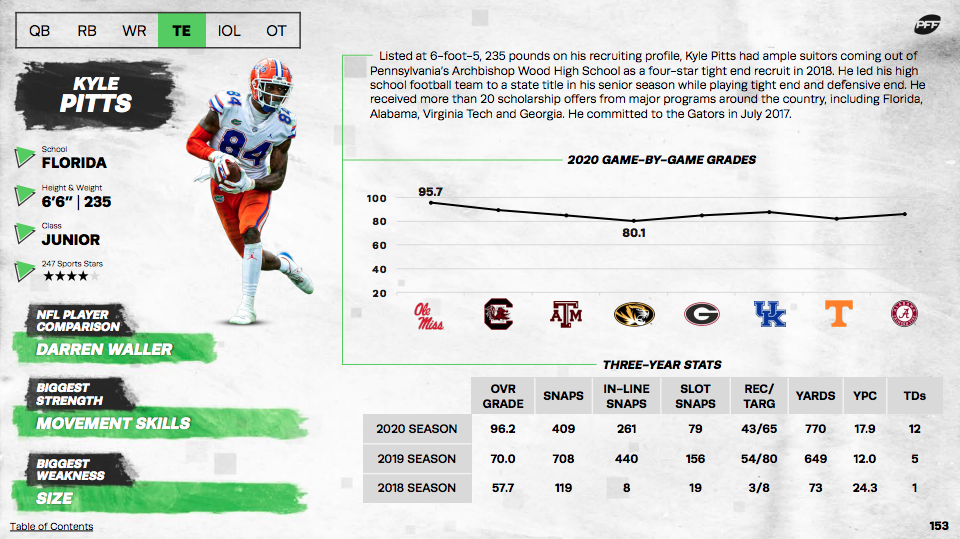
4. Atlanta Falcons: TE Kyle Pitts, Florida
The Falcons are in a weird spot, and we’re going to learn a lot about how they perceive themselves in this draft. The team will signal the transition away from the Matt Ryan era if they select a QB here. If not, they probably believe they have the roster to compete if some things break their way in 2021. They could take a linebacker like Micah Parsons, but one linebacker isn’t going to turn things around single-handedly. The fourth overall pick is also too high to draft a linebacker. If it’s not a quarterback, then give Ryan another weapon — that’s Kyle Pitts.
Key Change: The Falcons averaged only 4.2 yards after the catch when throwing to players lined up as an inline tight end or in the slot. Kyle Pitts averaged 7.3 yards after the catch per reception last season.
Related: 2021 NFL Draft Profile: Florida TE Kyle Pitts via Sam Monson
5. Cincinnati Bengals: T Penei Sewell, Oregon
The Bengals will certainly entertain a playmaking receiver here, and had Joe Burrow not suffered a serious knee injury late last season, they might have been very well set on taking one. However, they now need to show that they are willing to invest in protecting their quarterback. Sewell becomes a no-brainer.
Key Change: Bengals tackle Bobby Hart allowed 45 pressures last season, the fifth-most in the league. Sewell allowed eight in 2019.
Related: Oregon offensive tackle Penei Sewell is one of the best tackle prospects we have ever seen via Eric Eager
6. Philadelphia Eagles: QB Mac Jones, Alabama
The Eagles will want to see what they have in Jalen Hurts, and while there is excitement, his play didn’t match that excitement last year. Hurts does give you some playmaking ability, but he was dreadfully inaccurate last season. Philadelphia desperately needs an accurate passer to compete with Hurts in camp.
Key Change: Hurts generated the fourth-lowest accuracy rate in the NFL last season. Jones finished No. 1 in the same category in college in 2020.
Related: Alabama QB Mac Jones has orchestrated what is arguably the best passing attack in college football history via Anthony Treash
7. Detroit Lions: WR DeVonta Smith, Alabama
It looks like the Lions will have an entirely new receiving corps next season, and if they want Jared Goff to have any type of success, they’ll need a playmaker to join him. A lot of Goff's yards in L.A. came underneath on option routes to Cooper Kupp, so finding someone who can get open quickly and then make plays after the catch is important. Enter DeVonta Smith.
Key Change: Lions receivers graded out to 51.7 on throws behind the line of scrimmage last season, 24th in the league. Smith’s grade was 88.2 on those same throws last year.
Related: 2021 NFL Draft Profile: Alabama WR DeVonta Smith via Sam Monson
8. Carolina Panthers: QB Zach Wilson, BYU
Both Carolina and Denver will be unhappy with their quarterback situation, and there’s no reason for them not to roll the dice on that position. The Panthers could go with any of the top quarterbacks on the board here, but they go with Wilson because of the playmaking ability.
Key Change: Teddy Bridgewater was the 17th-highest-graded quarterback outside of the pocket last season at 59.7. Wilson was the third-highest-graded quarterback in that area in college last season.
Related: How does BYU's Zach Wilson's 2020 season compare to Joe Burrow's 2019 at LSU? via Seth Galina
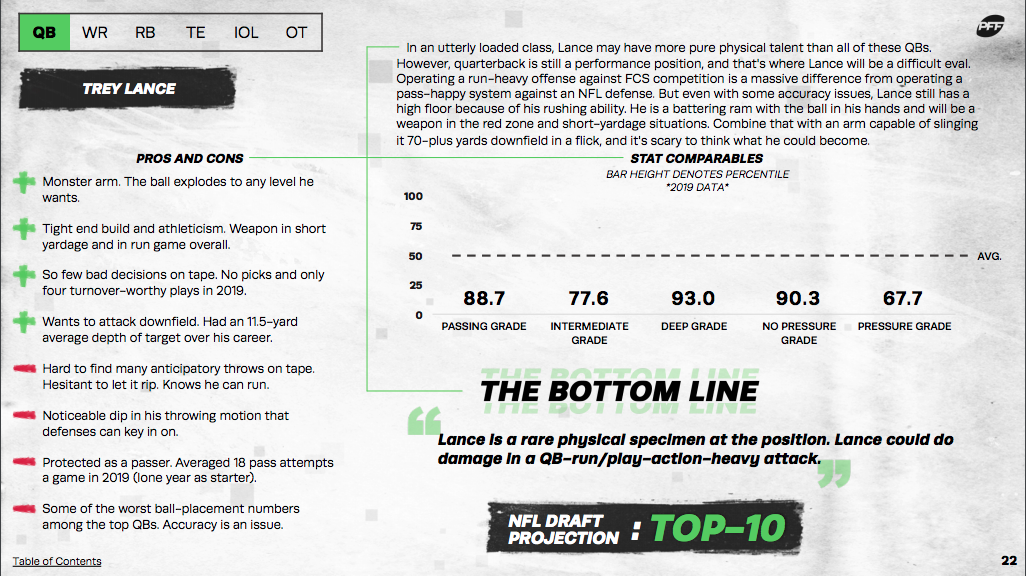
9. Denver Broncos: QB Trey Lance, North Dakota State
With the other four quarterbacks off the board, the Broncos are left with Trey Lance — but the North Dakota State product might have the most upside of any of the “big five” quarterbacks. He’s an elite runner and understands how to get through his progressions, although the accuracy is a concern.
Key Change: Drew Lock averaged 3.6 yards per rush on both scrambles and designed runs last season. Trey Lance averaged 6.8 yards per rush in 2019.
Related: College-to-pro projections for North Dakota State QB Trey Lance via Eric Eager
10. Dallas Cowboys: CB Patrick Surtain II, Alabama
The Cowboys have holes all over their defense, but their lack of playmakers in coverage is a weakness too serious to overlook. The Cowboys will play a lot of single-high defenses now that Dan Quinn is running the show, which means the corners will be put on islands and attacked.
Key Change: The Cowboys allowed 67% of passes to wide receivers to be caught last season, the league's sixth-highest rate. Surtain only allowed 40% of passes to be caught when he was covering wide receivers.
11. New York Giants: EDGE Kwity Paye, Michigan
The Giants also have many holes, and finding a playmaker for Daniel Jones would be important. They could easily go with Jaylen Waddle here, but Paye is also a playmaker — he just plays on the other side of the ball. Raw but incredibly talented, Paye would represent a significant upgrade at edge for the Giants.
Key Change: The Giants' cumulative grade for their edge players last season was 57.8, 28th in the league. Paye’s grade over the previous two seasons is 86.8
12. San Francisco 49ers: CB Caleb Farley, Virginia Tech
With the 49ers most likely losing Richard Sherman in free agency, it’s time to get younger at the position. Farley is young and extremely athletic. Left on islands a lot in Virginia Tech’s system in 2019, he performed at an elite level, allowing a passer rating of just 26.8 on throws into his coverage.
Key Change: Richard Sherman was born in 1988. Caleb Farley was born in 1998.
Related: 2021 NFL Draft Profile: Virginia Tech CB Caleb Farley via Sam Monson
13. Los Angeles Chargers: T Rashawn Slater, Northwestern
Justin Herbert’s grade under pressure last season was an incredible 75.4, the best in the league. Assuming that number regresses, the Chargers will need to give him more clean pockets to work from. They’ll get that in Slater, who some think is the best tackle prospect in the draft.
Key Change: The Chargers' cumulative grade at tackle was 56.2, the second-lowest in the league last year. Slater’s was 90.0 in 2019.
14. Minnesota Vikings: EDGE Jayson Oweh, Penn State
The Yannick Ngakoue signing didn’t work out, and now it looks as though Danielle Hunter wants out of Minnesota, so taking an edge could end up being a top priority for the Vikings. Mike Zimmer is going to love Oweh because his play against the run is just as good as his play when rushing the passer.
Key Change: Vikings edge players tallied 12 tackles for loss or no gain across 454 snaps against the run last season. Oweh recorded eight across 288 snaps over the last two seasons.
15. New England Patriots: WR Rashod Bateman, Minnesota
No matter who their quarterback is next year, the Patriots need production from the receiver position. They have no one who can win in the air, separate in the route or win off the line of scrimmage. Bateman provides all three.
Key Change: When lined up out wide, Patriots receivers only caught 30% of their contested targets. Bateman caught 70% of his contested targets when lined up out wide over the last two seasons.
Related: 2021 NFL Draft Profile: Minnesota WR Rashod Bateman via Sam Monson
16. Arizona Cardinals: DI Christian Barmore, Alabama
A slot receiver would be a big consideration for the Cardinals, and Waddle could be the pick if he's still available, but this team was just awful along the interior defensive line last season. Barmore is raw but easily has the most upside for any interior defensive lineman in the draft. His technique and agility are elite for the position.
Key Change: The Cardinals' cumulative grade from interior defensive linemen was 41.7 last season, the second-lowest in the league. Barmore comes in at 90.7 over the previous two seasons.
17. Las Vegas Raiders: EDGE Gregory Rousseau, Miami (FLA.)
A lot of teams would have loved to see Rousseau play in 2020 after an impressive 2019. The traits are there, but he wasn’t quite ready as a defensive lineman that season. Still, someone will take him to see if they can teach him how to play. If he figures it out, he’s a top-five player at the position.
Key Change: Among all defensive line positions, the Raiders ranked 25th in cumulative pass-rush grade at 64.8. Rousseau, who has logged reps all over the defensive line, earned a pass-rush grade of 80.8 in 2019.
18. Miami Dolphins: T Christian Darrisaw, Virginia Tech
With their second pick in the first round, the Dolphins can go after any player who falls to them. It could be Parsons or Ojulari, but I think it’s best to go after a player who could help the offensive line. At Pick 18, Darrisaw could be an immediate upgrade over both tackles they took in the first round last season.
Key Change: Austin Jackson and Robert Hunt earned grades of 74.1 and 87.1, respectively, in their final season of college football. Darrisaw was at 95.6 last year.
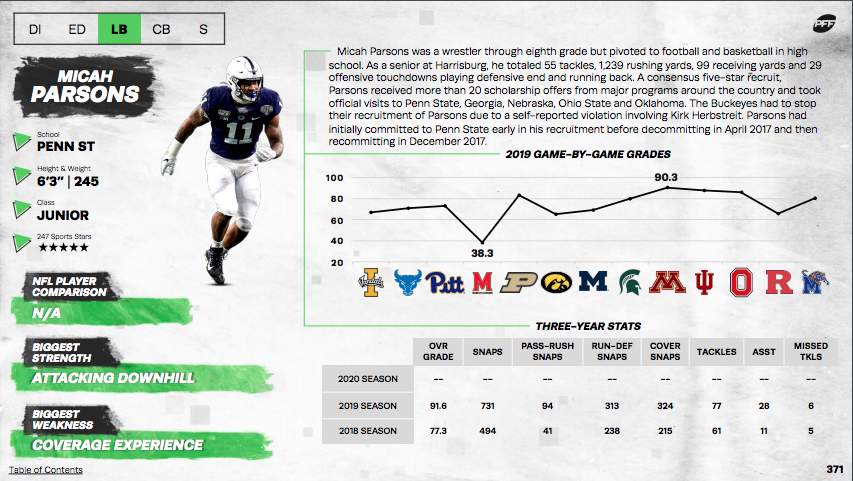
19. Washington Football Team: LB Micah Parsons, Penn State
Parsons probably won’t fall this far, but it’s hard to find a team that would take a linebacker anytime before this. If he does fall to the late teens, Washington should feel good taking him here — he’ll be an upgrade over the middle of their defense.
Key Change: Washington linebackers put up a 47.3 run-defense grade last season, 23rd in the league. Parsons graded at 95.0 against the run in 2019.
Related: 2021 NFL Draft linebacker rankings via Mike Renner
20. Chicago Bears: WR Jaylen Waddle, Alabama
Whoever the quarterback is for the Bears next season, they will need a receiver to presumably replace Allen Robinson II. If either Waddle or Bateman falls to them, it’s a no-brainer. Even if they keep Robinson, they still need a dynamite slot option. Waddle is that guy.
Key Change: Bears receivers posted a cumulative 74.8 receiving grade when lined up in the slot last year, 26th best league-wide. Waddle was at a whopping 98.7 over the last two seasons.
Related: 2021 NFL Draft Profile: Alabama WR Jaylen Waddle via Sam Monson
21. Indianapolis Colts: EDGE Azeez Ojulari, Georgia
Ojulari is a player I am in love with because he plays hard on every snap, whether it’s a run or pass. The Colts could easily pick an offensive player to surround new quarterback Carson Wentz, but they also need help at edge, where they had major trouble getting after opposing quarterbacks.
Key Change: The Colts' cumulative edge grade was the seventh-lowest in the league last season. Ojulari earned an 88.9 grade there in 2020.
22. Tennessee Titans: EDGE Jaelan Phillips, Miami (FLA.)
Phillips is the feel-good story of the draft. After starting his career at UCLA, he retired from football due to concussions but returned to play 2020 at Miami, where he showed why he was a former five-star recruit. Now, he’s considered a fringe first-round pick. With the Titans losing Jadeveon Clowney, he could be a solid replacement.
Key Change: The Titans recorded a pass-rush win rate of 39.6% last season, the third-lowest in the league. No individual player topped a win rate of 20%, which is where Phillips was in 2020.
23. New York Jets (from Seattle): CB Asante Samuel Jr., Florida State
Another team that can’t cover outside receivers gets an immediate upgrade at the cornerback position. The Florida State defense was a lot worse than anyone would have expected last season, but Samuel still played lights out and was the 10th-highest-graded cornerback in the country.
Key Change: The Jets were the worst team at covering outside receivers last season, with a cumulative coverage grade of 28.2. Samuel’s overall coverage grade was 82.8 last year.
24. Pittsburgh Steelers: WR Rondale Moore, Purdue
With Ben Roethlisberger and his (way below) average depth of target coming back in 2021, the Steelers need someone to take those short passes and make plays. That’s what Rondale Moore can do. Also, out of all the shifty, gadget type of receivers, Moore is probably the best overall receiver of the bunch.
Key Change: Despite the abundance of short passes, the Steelers were still only 22nd in the league with 4.8 yards after the catch per reception. Moore’s was a clean 7.0 over the last two seasons.
Related: 2021 NFL Draft Profile: Purdue WR Rondale Moore via Sam Monson
25. Jacksonville Jaguars (from L.A. Rams): WR Kadarius Toney, Florida
Finding a player who can get open quickly for Trevor Lawrence is of the utmost importance. They don’t have that true jitterbug type of player. Laviska Shenault Jr. and Keelan Cole are good options in the slot but aren’t the same type of player Toney is.
Key Change: Jaguars receivers averaged 1.98 yards per route run from the slot in 2020, tied 25th in the league. Toney averaged 2.68 yards per route run from the slot over the last two years.
Related: 2021 NFL Draft Profile: Florida WR Kadarius Toney via Sam Monson
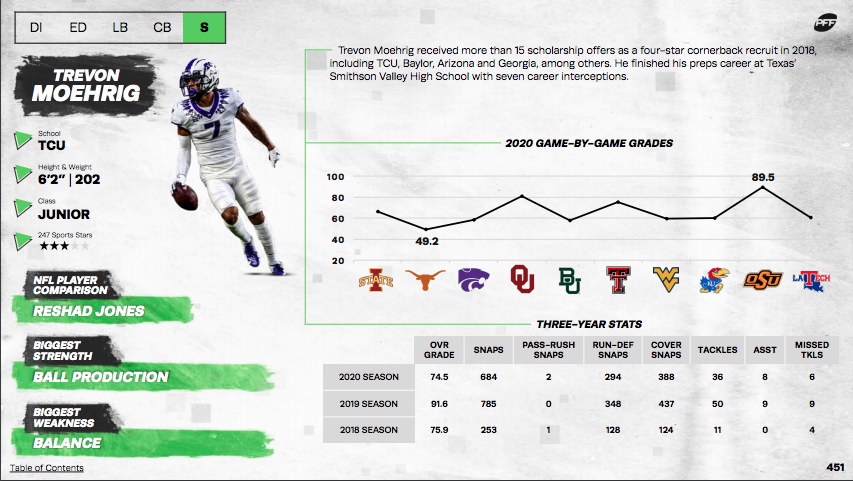
26. Cleveland Browns: S Trevon Moehrig, TCU
The Browns are oddly complete on offense and could end up going with the best player available on defense. Luckily for them, that player is Trevon Moehrig, who fills a significant need at safety. Moehrig is an all-around safety with the ability to stay deep in centerfield, play in the half-field and sometimes come down and cover slot receivers.
Key Change: Browns safeties earned the worst cumulative grade in the league last season at 48.2. Moehrig led the country in pass breakups over the previous two seasons from the safety position.
27. Baltimore Ravens: WR Terrace Marshall Jr., LSU
The Ravens need receiver help, and they specifically need a big X-type receiver. There is only a slim chance that Rashod Bateman will fall to them at Pick 27, so instead they get Marshall. The LSU product played outside during the Tigers' run to the 2019 national title but then moved inside and played some in the slot during the 2020 season.
Key Change: The Ravens scored 11 receiving touchdowns through players lined up out wide in 2020. Marshall hauled in 10 himself in 2020.
28. New Orleans Saints: CB Jaycee Horn, South Carolina
It's a legacy pick, as Jaycee Horn comes to the city his dad represented for many years. In a tough division for opposing cornerbacks, the Saints need help outside of Marshon Lattimore. Horn’s stock has been rising the last few weeks, and the Saints would be wise to pick him up should he fall.
Key Change: Every Saints cornerback allowed a completion rate above 50% this past season. Horn’s was a lowly 22% in 2020.
29. Green Bay Packers: LB Nick Bolton, Missouri
The Packers could hit on any linebacker here with Bolton, Zaven Collins and Jeremiah Owusu-Koramoah available. They haven’t been great at the linebacker position but could even try to find another cornerback to play opposite Jaire Alexander. Bolton is the pick as a true off-ball linebacker rather than JOK with his rover-type abilities.
Key Change: The Packers' cumulative off-ball linebacker grade was 39.4, second-worst in the league. They also recorded the second-fewest defensive stops from the position. Bolton led the SEC in defensive stops over the last two years.
30. Buffalo Bills: T Teven Jenkins, Oklahoma State
Jenkins falling to the Bills would be great for them should they lose Daryl Williams to free agency. They need a tackle, so getting a kid who is an absolute mauler and has improved every year in college would be huge. His grade went from 78.8 in 2018 to 85.7 in 2019 to 92.0 in 2020. You love to see that kind of linear progression.
Key Change: It’s not really a change per se, but going from Williams’ above-average 79.4 grade to Jenkins would be a smooth transition.
31. Kansas City Chiefs: G Alijah Vera Tucker, USC
We don’t know about the interior of the Chiefs' offensive line right now. We assume that the tackles will be healthy again to start next season, but with Laurent Duvernay-Tardif taking a year off and Kelechi Osemele getting injured during the season, they might need immediate help at the position. The players who stood in at guard throughout the 2020 season did not perform up to Chiefs levels.
Key Change: The Kansas City guards went from second in our pass-blocking efficiency metric in the 2019 regular season to 13th in 2020, and it got worse as the season went on. Vera Tucker changes that in a hurry.
32. Tampa Bay Buccaneers: EDGE Carlos Basham Jr., Wake Forest
This is a world where the Bucs fail to bring back Shaquil Barrett because they don’t have many holes otherwise. They hit on their draft picks last season, and unless they look for the future quarterback, Basham is the best edge available here.
Key Change: Again, this is not a change, but replacing Shaquil Barrett’s 17.2% pass-rush win rate over the last two regular seasons with Basham’s 18.5% win rate would be ideal.
Courtesy of PFF’s 2021 NFL Draft Guide, find PFF's top draft prospect, biggest riser and wild card to watch at each position here:
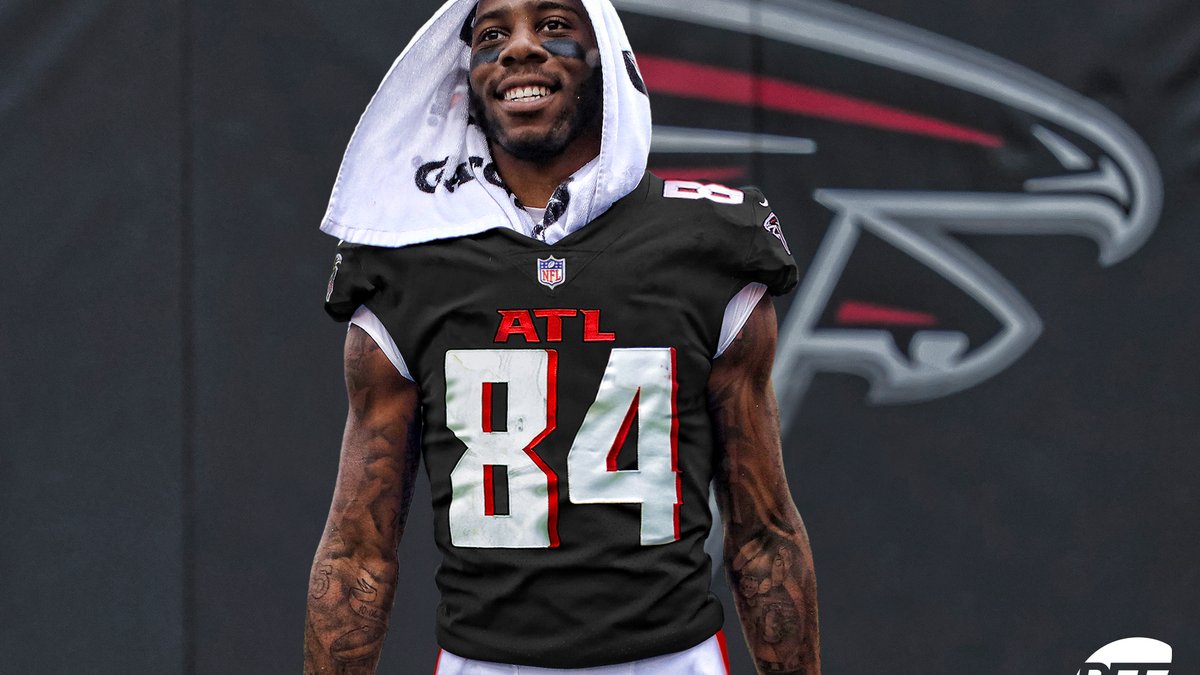



 © 2025 PFF - all rights reserved.
© 2025 PFF - all rights reserved.